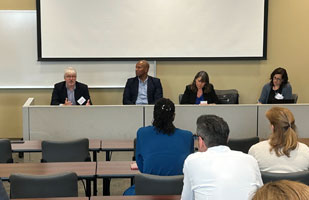Justice Lends Expertise to Group Researching and Analyzing Plea Bargaining Practices

Justice Michael Donnelly is part of a national group developing research to better understand how plea agreements impact the justice system.

Justice Michael Donnelly is part of a national group developing research to better understand how plea agreements impact the justice system.
Supreme Court of Ohio Justice Michael Donnelly recently joined the newly formed Plea Bargaining Institute at its first symposium. The group formed early this year to aggregate and analyze research on plea bargaining practices, as well as develop new research to better understand how plea agreements impact the justice system.
A plea agreement in a criminal case, also known as a plea bargain, is a negotiation between a prosecutor and a defendant in which the defendant pleads ‘guilty’ or ‘no contest’ to a criminal charge without a trial taking place. Both parties are looking for some form of benefit; the prosecutor usually wants the benefit of resolving the case, and the defendant wants a reduction in the potential consequences.
The majority of legal cases never go to trial. In Ohio, just over two percent of criminal cases and one percent of civil cases result in a trial. This mirrors the statistics in federal cases. In civil cases, most result in a negotiated settlement. Most criminal cases, where a person’s liberty is often at stake, also end in a negotiated plea.
For the defendant, the risk of a more severe punishment is reduced by a plea. However, in most cases, the defendant loses the possibility of being acquitted of the charges.
RELATED COVERAGE
Supreme Court Justice Calls for Plea Agreement ReformJustice Donnelly participated in the invitation only symposium. The Plea Bargain Institute is a new national think tank that brought together leaders on the topic of plea bargains to set its course for the future. The Institute will launch a website later this year in conjunction with the release of two academic papers. One will center on significant case law related to plea bargains. The other will report significant research that has already been done on the topic. The website will have a searchable database.
“The more data that is available for decision-making, the better decisions the courts can make,” said Justice Donnelly.
Lucian Dervan is a law professor and director of criminal justice studies at Belmont College of Law in Nashville and a founder of the Institute, “I’ve been engaged in plea bargain research and practitioners say, ‘I wish I had known about that research to support the argument I was making.”
Attendees at the symposium weighed in on what research academics should consider next, as well as what functionality practitioners want from the website.
The pros and cons of plea agreements are not a new topic in the law. They were the subject of a recent report by the American Bar Association Plea Bargain Task Force. The task force began in 2019 and over three years the group looked at plea bargains in criminal cases. The group took testimony and gathered data from a variety of sources. The report presumed good faith on the part of prosecutors and others in the justice system. And the result was 14 recommendations to promote transparency, accountability, and confidence in the criminal justice system as a whole.
“The goal is not to say what should be done in one local court system,” said Thea Johnson, associate professor of law at Rutgers Law School and the report’s main author. “The message that we wanted to get across is – this is the system we have now, not an ideal system in a perfect world – don’t resist moving toward the system we want.”
According to the report, plea bargaining is an incentive for defendants to cooperate with the government and take responsibility for their actions. Plea bargains can give clear and certain resolution to a case and bring finality for a defendant, victim, and the courts. Defendants also can avoid some of the most severe aspects of the corrections system in some cases. And using plea bargaining effectively can increase efficiency and reduce the weight on a heavily burdened system. When cases are settled without trial, other cases can get to trial faster.
The task force, however, has identified a coercive culture that has developed in some jurisdictions, where efficiency and finality have given way to innocent defendants taking plea deals because of the high risk of going to trial, particularly when mandatory minimum sentences could result. Data was presented where defendants of color were offered harsher penalties for the same crime as white defendants. Some defendants received longer sentences for exercising their right to trial, known commonly as the “trial tax” or “trial penalty,” and were denied the right to pretrial release. Some criminal defendants did not have access to an attorney before accepting a plea, and did not understand the full range of implications, including that they would waive their rights to postconviction relief.
Justice Donnelly testified to that task force in 2019. Donnelly emphasized the need for transparency. “Things can go awry in a nontransparent justice system,” said Justice Donnelly. “Both defendants and victims in the justice system deserve fair disclosure and transparency about the details of any proposed agreement.”
The report found the plea system varies widely among courts around the country. It did not offer proposals for specific legislation or policies. It provided recommendations of best practices.
Some of the suggestions include robust and transparent procedures at the plea to make sure the defendant understands the consequences of the plea, providing judges with more information, including a written record of the plea negotiation. The report also suggests courts collect and analyze data to monitor racial and other biases in the plea process.


